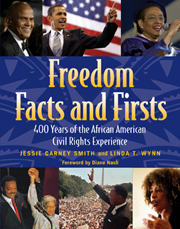African American Hero of the Day
Who organized the Universal Negro Improvement Association in 1914?
- In 1907 he helped establish the newspaper The Watchman.
- Moving to the United States from Jamaica, he helped establish the Universal Negro Improvement Association in 1914.
- He advocated the establishment of an independent state for African Americans.
- Late in life, he became active again in Jamaican politics, running unsuccessfully for office.

Marcus Garvey (1887-1940)
Journalist, Activist
Born August 17, 1887, in St. Ann's Bay, Jamaica, Garvey was the youngest of eleven children. Garvey moved to Kingston at the age of fourteen, found work in a print shop, and became acquainted with the abysmal living conditions of the laboring class. He quickly involved himself in social reform, participating in the first Printers' Union strike in Jamaica in 1907 and in setting up the newspaper The Watchman. Leaving the island to earn money to finance his projects, he visited Central and South America, amassing evidence that black people everywhere were victims of discrimination.
Garvey returned to Jamaica in 1911 and began to lay the groundwork of the Universal Negro Improvement Association, to which he devoted his life. Undaunted by lack of enthusiasm for his plans, Garvey left for England in 1912 in search of additional financial backing. While there, he met a Sudanese-Egyptian journalist, Duse Mohammed Ali. While working for Ali's publication African Times and Oriental Review, Garvey began to study the history of Africa--particularly the exploitation of black peoples by colonial powers--and he read Booker T. Washington's Up From Slavery, which advocated black self-help.
In 1914 Garvey organized the Universal Negro Improvement Association and its coordinating body, the African Communities League. In 1920 the organization held its first convention in New York. The convention opened with a parade down Harlem's Lenox Avenue. That evening, before a crowd of 25,000, Garvey outlined his plan to build an African nation-state. In New York City his ideas attracted popular support, and thousands enrolled in the UNIA. He began publishing the newspaper The Negro World and toured the United States preaching Black Nationalism. In a matter of months, he had founded over thirty UNIA branches and launched some ambitious business ventures, notably the Black Star Shipping Line.
In the years following the organization's first convention, the UNIA began to decline in popularity. With the Black Star Line in serious financial difficulties, Garvey promoted two new business organizations--the African Communities League and the Negro Factories Corporation. He also tried to salvage his colonization scheme by sending a delegation to appeal to the League of Nations for transfer to the UNIA of the African colonies taken from Germany during World War I.
Financial betrayal by trusted aides and a host of legal entanglements (based on charges that he had used the U.S. mail system to defraud prospective investors) eventually led to Garvey's imprisonment in Atlanta Federal Penitentiary for a fiveyear term. In 1927 his halfserved sentence was commuted, and he was deported to Jamaica by order of President Calvin Coolidge.
Garvey then turned his energies to Jamaican politics, campaigning on a platform of selfgovernment, minimum wage laws, and land and judicial reform. He was soundly defeated at the polls, however, because most of his followers did not have the necessary voting qualifications.
In 1935 Garvey left for England where, in near obscurity, he died on June 10, 1840, in a cottage in West Kensington.
From African American Almanac: 400 Years of Triumph, Courage and Excellence by Lean'tin Bracks, (c) 2012 Visible Ink Press(R). A wealth of milestones, inspiration, and challenges met . . .
| < Previous Fact | Next Fact > |
Dig deeper with these related titles:
 |
African American Almanac: 400 Years of Triumph, Courage and Excellence A wealth of milestones, inspiration, and challenges met. . . The most complete and affordable single-volume reference of African... Read More » |
|
 |
Freedom Facts and Firsts: 400 Years of the African American Civil Rights Experience Spanning nearly 400 years from the early abolitionists to the present, this guide book profiles more than 400 people, places, and events that have... Read More » |
|
 |
Black Firsts: 4,000 Ground-Breaking and Pioneering Events, 2nd Edition Black Firsts is a testament to a rich but often overlooked part of our history. Jessie Carney Smith, William and Camille Cosby Professor of the... Read More » |
|
 |
Black Heroes "If there is no struggle, there is no progress," wrote Frederick Douglass. "This struggle may be a moral one; or it may be a physical one; or it may... Read More » |




